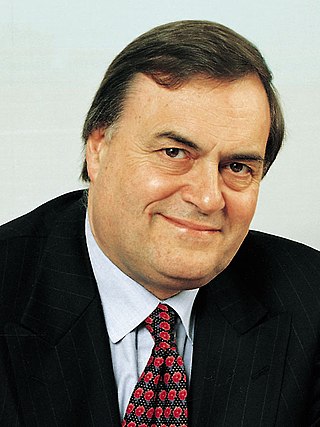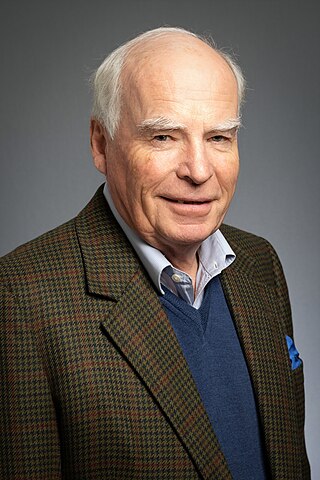John Swift KC is an English barrister [1] and a leading authority on competition law. Born on 11 July 1940, he was called to the English bar in 1965 and took silk (became a Queen's Counsel) in 1981. He became a Bencher of the Inner Temple in 1992.
John Swift KC is an English barrister [1] and a leading authority on competition law. Born on 11 July 1940, he was called to the English bar in 1965 and took silk (became a Queen's Counsel) in 1981. He became a Bencher of the Inner Temple in 1992.
From 1 December 1993 until 30 November 1998, Swift was Rail Regulator and International Rail Regulator, having been appointed to those posts by Conservative politician and Secretary of State for Transport John MacGregor.
In that time, the structure of the British railway industry was radically altered in preparation for privatisation, using powers under the Railways Act 1993. The industry was privatised in the period 1995–1997.
The most controversial part of the privatisation was the June 1996 flotation on the London stock exchange of Railtrack, the owner and operator of the national railway infrastructure network. Railtrack was severely criticised for its poor stewardship of the national railway network, and some observers also criticised Swift for what some saw as an excessively light touch in regulating a company which was malfunctioning in many ways. A year after the Hatfield rail crash on 17 October 2000, caused by a broken rail, Railtrack collapsed in highly controversial circumstances which led, eventually, to the resignation as Transport Secretary of Stephen Byers, Prescott's successor.
Swift's role and behaviour were critical to the successful privatisation of Railtrack and the rest of the industry. If he had been hostile to the process, it would not have been completed.
Upon the change of British government on 2 May 1997, Swift's chances of being reappointed as Rail Regulator diminished, and when Deputy Prime Minister John Prescott MP announced at the September 1998 Labour Party conference that he intended to carry out a 'spring clean of the regulators', Swift knew his days were numbered. He was succeeded as Rail Regulator by Chris Bolt (December 1998 – July 1999) and then by Tom Winsor (July 1999 – July 2004).
Swift received no national honour or recognition for his public service as Rail Regulator, a slight which some observers deprecated as unnecessary and inappropriate, given his long and distinguished service to competition law and industry reorganisation and privatisation.
Swift returned to private practice at the Bar, and became head of Monckton Chambers, a leading set of competition law chambers, until July 2001. He was in full-time practice as a member of Monckton Chambers from 1967 to 1992 and from January 1999 until July 2013.
In 2009, Swift became a panel member of the Co-operation and Competition Panel established by the Department of Health to administer the principles and rules for co-operation and competition for NHS funded services.
In April 2014, Ofgem announced Swift's appointment as the chairman of its new Enforcement Decision Panel. In its press release at the time, Ofgem said: "The Enforcement Decision Panel will bring a wealth of experience to the table and help Ofgem as we continue in our role to protect current and future consumers". In the same month, Monitor, the health service regulator, following the dissolution of the Co-operation and Competition Panel, of which Swift had been a member since 2009, continued his appointment in a new role as an expert adviser of the Board of Monitor and to its Co-operation and Competition Executive.

The railway system in Great Britain is the oldest railway system in the world. The first locomotive-hauled public railway opened in 1825, which was followed by an era of rapid expansion. Most of the track is managed by Network Rail, which in 2017 had a network of 9,824 miles (15,811 km) of standard-gauge lines, of which 3,339 miles (5,374 km) were electrified. These lines range from single to quadruple track or more. In addition, some cities have separate metro, light rail and tram systems. There are also many private railways, which are primarily short lines for tourists. The main rail network is connected with that of continental Europe by the Channel Tunnel and High Speed 1, which fully opened in 1994 and 2007 respectively.
Railtrack was a group of companies that owned the track, signalling, tunnels, bridges, level crossings and all but a handful of the stations of the British railway system from 1994 until 2002. It was created as part of the privatisation of British Rail, listed on the London Stock Exchange, and was a constituent of the FTSE 100 Index. In 2002, after experiencing major financial difficulty, most of Railtrack's operations were transferred to the state-controlled non-profit company Network Rail. The remainder of Railtrack was renamed RT Group plc and eventually dissolved on 22 June 2010.

Network Rail Limited is the owner and infrastructure manager of most of the railway network in Great Britain. Network Rail is an "arm's length" public body of the Department for Transport with no shareholders, which reinvests its income in the railways.

John Leslie Prescott, Baron Prescott is a British politician who served as Deputy Prime Minister of the United Kingdom from 1997 to 2007 and as First Secretary of State from 2001 to 2007. A member of the Labour Party, he was Member of Parliament (MP) for Kingston upon Hull East for 40 years, from 1970 to 2010. He was seen as the political link to the working class in a Labour Party increasingly led by modernising, middle-class professionals such as Tony Blair and Peter Mandelson and developed a reputation as a key conciliator in the often stormy relationship between Blair and Gordon Brown.
The Ladbroke Grove rail crash was a rail accident which occurred on 5 October 1999 at Ladbroke Grove in London, England, when two passenger trains collided almost head-on after one of them had passed a signal at danger. With 31 people killed and 417 injured, it was one of the worst rail accidents in 20th-century British history.

The Railways Act 1993 was introduced by John Major's Conservative government and passed on 5 November 1993. It provided for the restructuring of the British Railways Board (BRB), the public corporation that owned and operated the national railway system. A few residual responsibilities of the BRB remained with BRB (Residuary) Ltd.
The privatisation of British Rail was the process by which ownership and operation of the railways of Great Britain passed from government control into private hands. Begun in 1994, the process was largely completed by 1997. The deregulation of the industry was in part motivated by the enactment of EU Directive 91/440 in 1991, which aimed to create a more efficient railway network by creating greater competition.

The Strategic Rail Authority (SRA) was a non-departmental public body in the United Kingdom set up under the Transport Act 2000 to provide strategic direction for the railway industry. Its motto was 'Britain's railway, properly delivered'. It was abolished by the Railways Order 2006, its functions being absorbed by the Department for Transport or the Office of Rail Regulation.

The Hatfield rail crash was a railway accident on 17 October 2000, at Hatfield, Hertfordshire. It was caused by a metal fatigue-induced derailment, killing four people and injuring more than 70.

Sir Robert Alastair Newton Morton was Chief Executive of Eurotunnel and Chairman of the Strategic Rail Authority, industrialist and the last chairman of the British Railways Board.

The Office of Rail and Road (ORR) is a non-ministerial government department responsible for the economic and safety regulation of Britain's railways, and the economic monitoring of National Highways.

The Office of Gas and Electricity Markets (Ofgem), supporting the Gas and Electricity Markets Authority (GEMA), is the government regulator for the electricity and downstream natural gas markets in Great Britain. It was formed by the merger of the Office of Electricity Regulation (OFFER) and Office of Gas Supply (Ofgas).

Gerald Michael Nolan Corbett DL is a businessman who was the chairman of the Marylebone Cricket Club (MCC). A businessman, over a long career he has been a director of thirteen public companies, seven of which he has chaired. He is currently chairman of Segro plc, the FTSE 100 international industrial property logistics group. He chaired Britvic plc for 12 years until September 2017. Britvic plc is the international soft drink company whose brands include Robinsons squash, J2O, Tango, Fruit Shoot, Ballygowan water and is also a bottler for PepsiCo. As chairman he led the flotation of Britvic in 2005. He was chairman of Betfair plc between 2012 and 2016 when Betfair merged with Paddy Power plc to create Paddy Power Betfair.

London and Continental Railways (LCR) is a property development company owned by the Government of the United Kingdom for developing former railway land. The company was originally established in 1994 as a private consortium to own European Passenger Services and build the Channel Tunnel Rail Link (CTRL) under a contract agreed with the government.
Sir Thomas Philip Winsor is a British arbitrator and mediator, lawyer, consultant and economic regulatory professional.
The Rail Regulator was a statutory office holder, created with effect from 1 December 1993 by section 1 of the Railways Act 1993, for the independent economic regulation of the British railway industry. The Rail Regulator was in charge of an executive agency called the Office of the Rail Regulator.
Christopher Wesley Bolt CB is a British economist and civil servant who was the non-executive chairman of the Office of Rail Regulation, the national economic and safety regulatory authority for Britain's railways.
The Director of Passenger Rail Franchising was a statutory office holder in the United Kingdom created in 1993 by the Railways Act 1993 and usually called the Franchising Director. The role lasted from 5 November 1993 until 31 January 2001. The Franchising Director was in charge of an executive agency called the Office of Passenger Rail Franchising (OPRAF). It was superseded by the Strategic Rail Authority.

Passenger rail franchising in Great Britain is the system of contracting the operation of the passenger services on the railways of Great Britain to private companies, which has been in effect since 1996 and was greatly altered in 2020, with rail franchising being effectively abolished in May 2021.

The impact of the privatisation of British Rail has been the subject of much debate, with the stated benefits including improved customer service, and more investment; and stated drawbacks including higher fares, lower punctuality and increased rail subsidies. The privatisation of British Rail began in the 1990s.